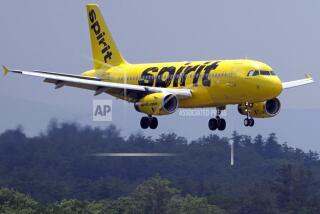Talk of airline consolidation quiets down
- Share via
US Airways Group Inc.’s decision Wednesday to drop its hostile bid for Delta Air Lines Inc. has damped speculation that a wave of consolidation is about to sweep the industry.
Airline deals may still be in the offing this year, analysts said. But the failure of US Airway’s high-profile effort sends a strong signal that the number of big domestic carriers is unlikely to shrink in the near future.
“I would say it’s now much less likely that we’ll see significant consolidation in 2007,” said Jim Corridore, airline analyst for Standard & Poor’s in New York. “I had thought it was imminent. Now, I think it’s still possible but not really in the cards.”
Tempe, Ariz.-based US Airways dropped its bid after the committee representing Delta’s unsecured creditors in U.S. Bankruptcy Court threw its support behind Delta’s plan to remain independent. The move ended a standoff between the two airlines that began in November, when US Airways offered $8 billion in cash and stock for its Atlanta-based rival.
Combining US Airways, the nation’s seventh-largest carrier in terms of traffic, with No. 3 Delta would have created the world’s biggest airline and was expected to kick off a scramble for merger partners among rivals looking to bulk up to remain competitive.
Removing a potential mega-carrier isn’t the only factor working against consolidation, analysts said. U.S. airlines are expected to report more than $5 billion in profits for 2006, reversing years of losses and reducing the financial pressure to seek partners.
In addition, US Airways’ bid for Delta ruffled feathers in Congress, where appearances last week by executives for the two airlines resulted in calls for increased regulation of the industry. The comments added to fears that the proposed tie-up would fail to pass muster with antitrust regulators, given concerns that combining the carriers’ overlapping East Coast networks could lead to higher fares in that region.
“The Justice Department and Congress will not allow a wave of mergers,” said Vaughn Cordle, chief executive of research firm Airline Forecasts in Washington. “It would create too much concentration and fares would go through the roof.”
Although the merger talk has quieted for now, analysts predicted that consolidation would make a comeback at some point. They contend that the airline industry, despite its recent turnaround, still needs to reduce the number of available seats in an effort to prop up airfares. Cordle said the average ticket price, adjusted for inflation, was still 24% below the level of 2000.
Among the combinations bandied about: UAL Corp.’s United Airlines with Continental Airlines Inc., and AMR Corp.’s American Airlines with Alaska Air Group Inc.’s Alaska Airlines. Delta was even rumored to be talking with rival Northwest Airlines Corp. about a deal that would have thwarted the US Airways bid.
A UAL-Continental tie-up would combine United’s strong transpacific route system with Continental’s service to Europe and Latin America. A marriage of AMR and Alaska would boost American’s presence along the West Coast.
Northwest also is seen by some as a better fit for Delta than US Airways because there is less overlap in domestic routes and their international networks are complementary. Delta is strong in serving Europe, and Northwest is a major player in the U.S.-to-Asia market.
US Airways, meanwhile, is expected to continue to seek out a partner despite Chief Executive Doug Parker’s statement Wednesday that he was “extremely confident in our own stand-alone plan.”
Parker said he was disappointed that the Delta creditors committee declined US Airways’ bid. Last month, US Airways sweetened its offer, which was worth $9.75 billion at the close of trading Tuesday.
Delta, led by CEO Gerald Grinstein, mounted a tenacious defense, rallying employees and making his case before Congress and in media interviews. Despite his resistance, Grinstein has said he won’t rule out a deal with another airline once Delta exits bankruptcy proceedings.
A hearing on Delta’s reorganization plan is set for Feb. 7. The plan places the airline’s value as high as $12 billion. Cordle said the plan also would give top management a stake in the carrier worth hundreds of millions of dollars.
On Wall Street on Wednesday, an index of 11 airline stocks declined a mild 0.1%. However, the index has fallen almost 12% in recent weeks as investors became convinced that a deal was not going to happen. US Airways’ shares, also down recently, gained $2.88, or 5.4%, to $55.98.
*
More to Read
Inside the business of entertainment
The Wide Shot brings you news, analysis and insights on everything from streaming wars to production — and what it all means for the future.
You may occasionally receive promotional content from the Los Angeles Times.










